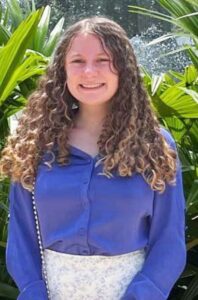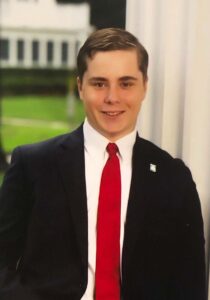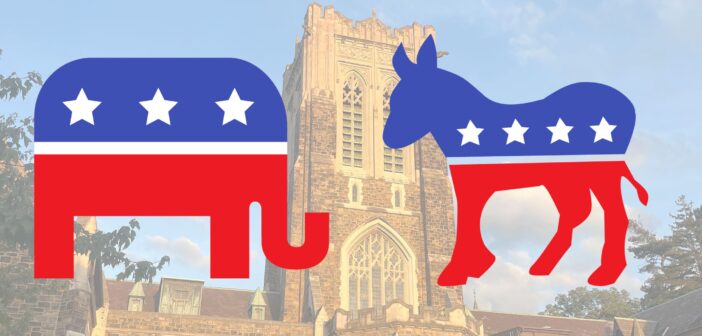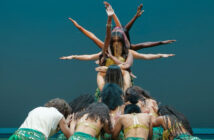The Brown And White interviewed Julie Wright, ‘26, president of the Lehigh College Democrats, and Stephen Kelly, ‘24, president of the Lehigh College Republicans, about their political experiences on campus and the culture between the two organizations.

Julie Wright, ’26, studies community and global health and is the president of the Lehigh College Democrats.

Stephen Kelly, ’24, studies civil engineering and is the president of the Lehigh College Republicans.
Question: Have you ever worked with or had contact with the other club on campus?
Julie Wright: “I’ve had a class with the vice president (of Lehigh College Republicans) every semester here at Lehigh, but we haven’t talked about it. (Vice President for Student Affairs Ric Hall) also did this thing at the beginning of the year where they wanted to give both clubs money, and they said they would give us more money if we did an event together. We were down to do (it), but neither of us could think about how to spend that money.”
Stephen Kelly: “Yeah, up until recently, Civic Engagement Day (activities) were run by Douglass Dialogues (and the Student Senate), so we had a lot more interaction with (Lehigh College Democrats) in prior elections. We maintain a friendly contact. We are trying to coordinate some events with them, either this semester or next semester, about the importance of voting in general.”
Q: What events do you generally hold, either this year with the local elections or during a bigger election season?
JW: “We are in an off-year election, so I think it’s been a little bit harder to organize. Thinking about the spring semester, we’re going to move into some more discussion-based things and ways to engage the campus community more as a whole, which I’m really excited for. We did tabling for voter registration once. For our first meeting, we had Professor Karen Pooley come in because she’s running for the school board and she specializes in urban planning. We try to do a 5×10 every year. This year, we did a 5×10 called, “Why Judicial Elections Matter.” We had judicial candidates Daniel McCaffery and Brian Panella come in and also Jill Beck on Zoom.”
SK: “We have three types of events. The first are community service events. There is this (organization) called Victory House where we feed homeless veterans. We do fun events where we watch a movie, something vaguely patriotic-themed, and then have pizza. The third one is the civic engagement information, where we invite speakers, like two of three Republican candidates for City Council. In 2020, I think we had Lisa Scheller over — she was running for Congress.”
Q: Have you experienced any backlash on campus while in your position?
JW: “I haven’t had to deal with too much upfront yet. I think it’s just that it’s more something you just hear about when you’re organizing efforts… I think most of the backlash just comes from the perception that politics is scary or that it’s unnecessary to make noise about stuff like that.”
SK: “I mean, I feel for the most part, like 75% of interactions that do get political is more like, ‘Oh yeah, Steve’s a Republican.’ That’s about it, as far as it goes, but I haven’t had a bad experience on campus talking about politics, but mostly because I won’t bring it up on my own.”
Q: What are your thoughts on the recent Compelling Perspectives event with speaker Theresa May?
JW: “We both were at the Theresa May talk, and also a little Q&A before that. Lehigh has a heavy emphasis on having meaningful conversations. It’s something that affects the work that (both clubs) do, and I’m just curious to hear their perspectives on it. I mean obviously we’re going to disagree on a lot of political issues, but I think in the context (of) having meaningful discussions, I’d be interested in hearing what they have to say. At the end of the day, we’re both trying to get Lehigh engaged on campus and trying to give support to the people we care about.
SK: “I think it’s good having these events, not just with Theresa May. I think the series as a whole (and) the idea behind it, introducing thoughts and opinions that not everyone agrees with and just learning from them (is good). Overall, I feel like the Theresa May event went well. It was pretty cool to sit within an arm’s reach of a former prime minister.”
Q: Have you thought about hosting a debate with each other in the future?
JW: “I don’t know if getting into a super heated discussion with the Republicans is something that is beneficial to both organizations. Honestly, I have mixed feelings on doing a debate just because I feel like there are better ways to engage more people rather than just limiting a debate to the words of the two clubs. It’s so easy to look at our two groups and be like, ‘Oh, they oppose each other, let’s do something productive here,’ and there’s so much more to politics than defeating your enemies. Elections and having debates and all that fiery stuff is super important, but when I think about the needs of the student body, I think that comes from showing how getting engaged with politics is fun.”
SK: “We actually do these events called “What We Agree On” — we did debates a while back and those got a little too heated, so instead we do the talks kind of frequently. We find out that on most issues, we agree most of the time. Maybe we agree on 80% of stuff and the last 20% are the specifics that we don’t really agree with.”
Q: Why are local elections, like those of the current election season, so important to get involved with?
JW: “It’s a level of government that you can get involved with the most easily, but it’s also the level of government that has the most influence over your daily life. We’re talking about things like taxes and education and even local laws and infrastructure. Those are all things that come from the local level, and those are the things that you interact with in your daily life that sometimes don’t always look political, even though they’re super important. I feel like local elections are kind of fun, in a sense, because they remind you of your place in the community and the community that you live in.”
SK: “These are the elections that actually impact local stuff. One of the big things is the roads haven’t been paved over recently, which is one of the issues that the City Council candidates brought up. So if you vote for them, it’s not like the roads are going to be magically paved overnight, but they will make it more of an issue in City Council meetings. Your voice gets heard a little more.”






Comment policy
Comments posted to The Brown and White website are reviewed by a moderator before being approved. Incendiary speech or harassing language, including comments targeted at individuals, may be deemed unacceptable and not published. Spam and other soliciting will also be declined.
The Brown and White also reserves the right to not publish entirely anonymous comments.
2 Comments
Two very reasonable people with differing views what wonderful news. With most of the news I see this is a rare occurrence.
Thoughtful and evocative questions! This was a fascinating and informative article. It is encouraging to see the next generation be passionate about not only politics in general, but also the political process as a whole, and how it affects local communities.